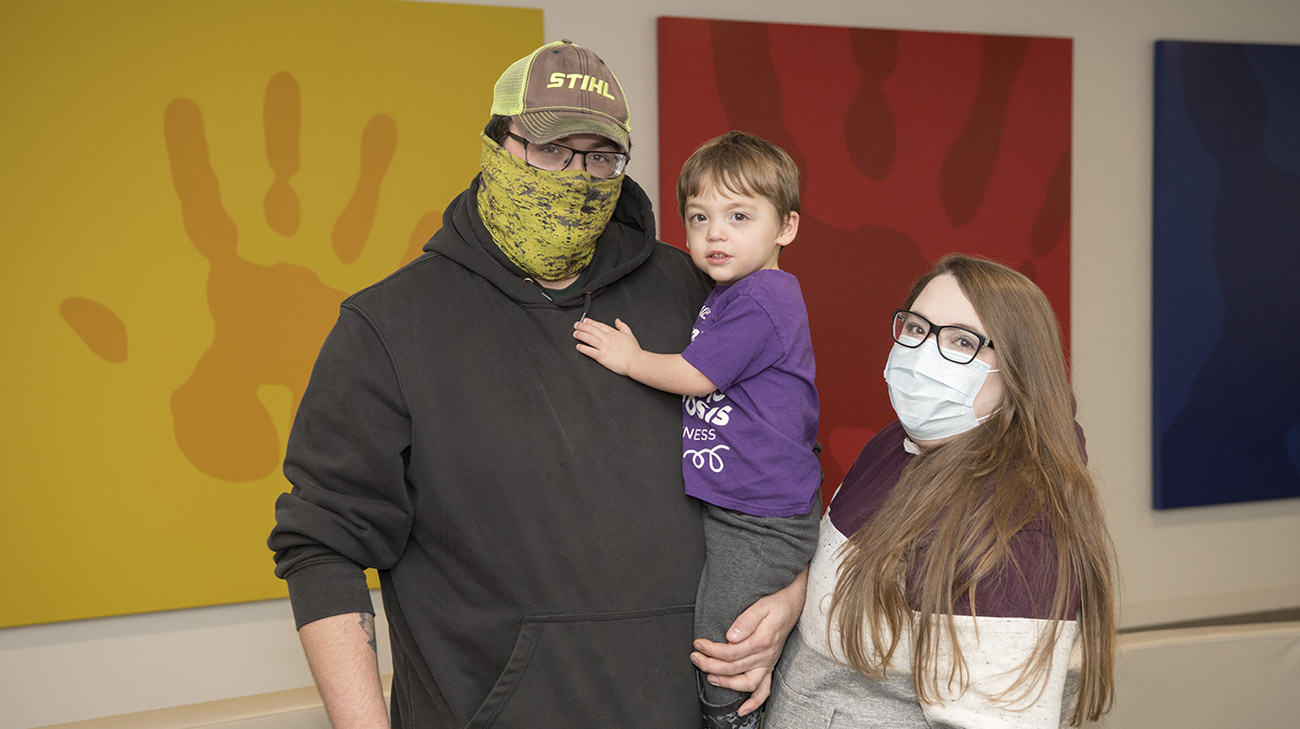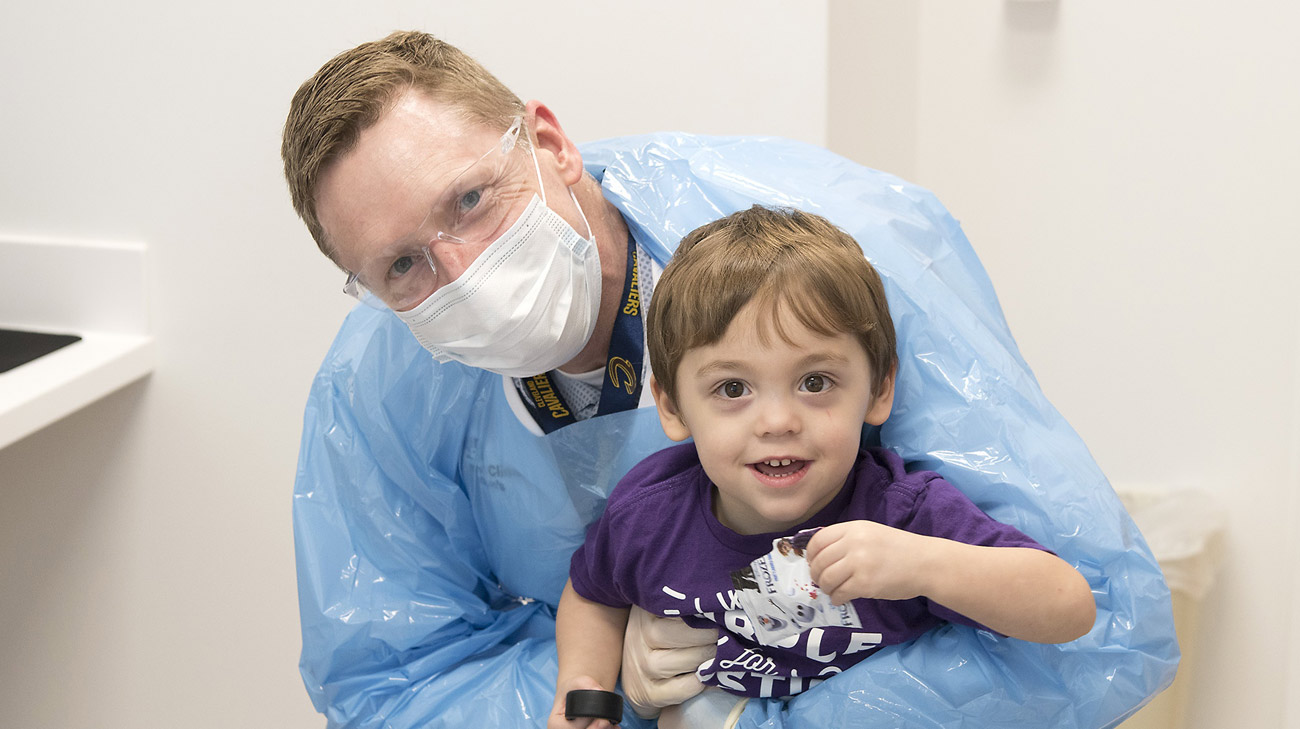
About 1 in 3,500 Caucasian infants born in the U.S. is diagnosed with cystic fibrosis (CF), a genetic disease that causes thick, sticky mucus to build up in the lungs, pancreas and gastrointestinal tract. Most are diagnosed through a newborn screening when a few drops of blood are taken from a heel prick. But in about 20% of cases, including that of Maverick Leamer, diagnosis isn’t quite as simple.
Meagan is Maverick’s mom. Born healthy, she developed health issues as a child that resulted in her undergoing kidney transplant surgery twice at Cleveland Clinic – first at age five, again at 21.
“Because of my health history and transplanted kidney, I knew that if and when I became pregnant, I’d be considered high-risk because pregnancy is very taxing on the kidneys – even in women with no health concerns,” says Meagan, who suffered a miscarriage of her first pregnancy.
Despite that, the local transplant team and Meagan’s Ob/Gyn in their home town of Erie, PA, were confident she could have a successful pregnancy and gave her a date at which she and her husband, Kanyon, could try again.
“About 15 weeks into my pregnancy with Maverick, my local Ob/Gyn dropped me as a patient. Because of my own experience with Cleveland Clinic, we opted to continue to receive pregnancy care there,” says Meagan.
The pregnancy progressed normally with frequent monitoring until 26 weeks when an abnormality was seen on an ultrasound. Maverick was already quite large, and amniocentesis – a sampling of amniotic fluid to diagnose chromosomal abnormalities – was recommended, along with transferring Meagan’s care and plans for delivery from Cleveland Clinic Hillcrest Hospital to main campus, where there would be immediate access to specialists from every discipline if needed.
“We see Dr. Kraynack every two months, and he is phenomenal with Maverick. He’s also always just a text away to answer any questions.“
“Following amnio, Maverick had other ideas. At 29 weeks, I started bleeding. We went to the local ED, where they administered a shot to help with Maverick’s lung development. But they didn’t think I was in labor. I signed out against medical advice and we drove to Cleveland Clinic,” recalls Meagan.
Despite efforts to stop or slow her labor, after four days, Maverick’s heart rate was dropping while Meagan’s blood pressure was spiking. “Maverick came out really quickly, I only pushed for 5-to-10 minutes. We did have a chance to hear him cry and hold him before he was taken to the NICU. Born on September 11, he weighed almost 4 ½ pounds,” says Meagan.
Multiple heel pricks did not indicate cystic fibrosis, but Maverick was diagnosed with meconium ileus, a bowel obstruction and a perforated small intestine, which are typically indicators of CF. At two days old, he underwent surgery and had an ileostomy – an opening in the belly that diverts the small intestine.
While Maverick was in the NICU, Nathan Kraynack, MD, a pediatric pulmonary medicine specialist at Cleveland Clinic Children’s Hospital became part of Maverick’s care team. “99 times out of 100, a bowel obstruction in a little Caucasian baby like Maverick means CF. But standard testing only picks up the CF genes about 80% of the time. And because of Maverick’s ileostomy, we were not able to conduct a standard test to check the function of his pancreas,” says Dr. Kraynack.
The Leamers returned home feeling things were as good as they could be; however, the ileostomy was failing so they returned to Cleveland Clinic for a procedure to reconnect Maverick’s bowel.
“After that procedure, we left the hospital thinking we had a healthy baby and nothing to worry about,” says Meagan. “Then the phone rang. I was home alone with Maverick, and it was Dr. Kraynack calling to confirm the CF diagnosis. I hung up on him. The next few days were the darkest I hope our family ever has to have.”
Dr. Kraynack shared that Maverick had two gene mutations – one from his mother and one from his father. Both were very rare, falling into the small percentage the CF newborn screening does not find.
“Aspects of Maverick’s situation like the perforated bowel at birth, bowel obstructions while he was in the NICU and issues with the ileostomy bag all pointed to CF. It was truly a team effort to get to the final diagnosis, but I don’t blame Meagan for hanging up on me. I can’t imagine being in their shoes,” says Dr. Kraynack, who informed Meagan and Kanyon that Maverick needed to start on medication right away.

Maverick Leamer with Dr. Kraynack, who is fondly called the "coach" of Maverick's caregiver team. (Courtesy Cleveland Clinic)
“One of Maverick’s gene mutations is mild, the other moderate. By starting him on medication when we did, we hoped to manage the disease early on,” explains Dr. Kraynack. “The biggest challenge CF kids face is failure to thrive – they cannot gain weight despite having a good appetite and taking in enough calories, which can lead to slow growth. Maverick’s medications target his pancreas, helping him to digest food more efficiently.”
Now age 2, Maverick, like all young children with CF, is more susceptible to a simple viral infection turning into a bacterial lung infection, which are treated aggressively with antibiotics. He also undergoes breathing treatments to open his airways and has a pneumatic compression vest to help loosen and shake out mucus.
“Maverick was a bit underweight when I first met him but his growth now is a little better than normal. Meagan and Kanyon have done a fantastic job with using medications, doing treatments and things that that Maverick needs to thrive including feeding him a high fat, high salt, high calorie diet,” says Dr. Kraynack. “They’ve embraced our entire program as to how to treat people with CF. To look at Maverick, you’d never realize he had such a rocky start. That’s a real tribute to this family. I’m just the coach of their team. They are the team, they get it done.”
As for the relationship between Meagan and Dr. Kraynack? She now considers him part of their family. “We see Dr. Kraynack every two months, and he is phenomenal with Maverick. He’s also always just a text away to answer any questions,” says Meagan.
Related Institutes: Respiratory Institute

